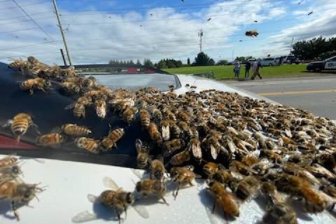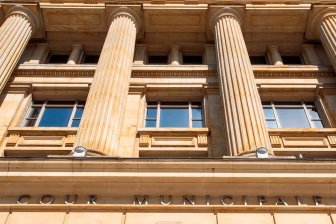Convoy planning to break N.W.T. evacuation order urged to stay away as state of emergency extended | Globalnews.ca

[ad_1]
The people of Northwest Territories have been out of their homes for a few weeks now and some people appear to be getting fed up and are planning to break the evacuation order.
The Northwest Territories RCMP said it’s received information about a group of people who may be planning an unsupported return to Yellowknife.
Mounties said the the group of people are planning to re-enter in the territory in as many as 50 vehicles from Alberta and that “they will not stop for the checkpoints.”
“The information we’ve received to date is that it’s in the planning phase as opposed to a bunch of vehicles on the road,” Cpl. Matt Halstead, a media relations officer with the Northwest Territories RCMP, told Global News on Wednesday.
“We wanted to basically get out in front of it and try and discourage that type of activity.”
The RCMP and territorial officials said they strongly discourage any resident from returning as the evacuation orders and territory-wide state of emergency remain in effect.
It is not safe to return and police said those not approved for re-entry will be turned away.
Halstead explained the roads, even the main highway, in the north are not like a typical Alberta freeway with several lanes and a wide shoulder.
“We have a very narrow roadway that we rely on for support for our firefighting activities right now. Everything from food to gas that comes in to support the people that are here could potentially be impacted by 50 vehicles snarling traffic or or creating a hazard on the roadway.”

He added there is some significant wildfire activity near the main highway that has reduced visibility in an area with no cell coverage, plus there is a lack of emergency services to respond to a collision or medical emergency, meaning if drivers get into trouble, help will not be easy to reach.
“We understand people are frustrated, but this is not the way to deal with that frustration.”
A state of emergency in the Northwest Territories has been extended until Sept. 11 and Premier Caroline Cochrane said she understands the frustration of those forced from their homes.
“I know how people feel. We’re all evacuated and people are tired, they want to be home. But it’s really important that people not try to go home until they’re called, until it’s time,” Cochrane said.
She added those returning can put first responders at risk.
“Every single community that we’ve evacuated — and we’ve had 10 evacuations this year alone — there’s always people that want to stay behind. And the reality is, is that then we have to focus on saving those people instead of fighting the fires.
“So, please, I know you’re tired, but please stay out until it’s safe to go home.”
The RCMP have the authority under the Emergency Management Act to enforce checkpoints, it said.
Police said anyone who engages in activity that risks the safety of department of infrastructure staff or RCMP officers at the checkpoints, may face prosecution.
“The information received is that the people participating in this will not stop for blockade,” Halstead said. “That could create a hazardous situation for the people there. We really hope it doesn’t come to that. And I sincerely hope that people consider the safety of others if they’re going to engage in activity like this.”

The communities under evacuation are not prepared for a mass return of residents. Grocery stores are closed and the limited resources available in the communities are intended to support firefighting efforts and essential personnel.
Cochrane spoke about the situation Wednesday in Edmonton, where she was touring the EXPO Centre evacuation centre alongside federal ministers Randy Boissonnault and Dan Vandal, Alberta Forestry Minister Todd Loewen and Edmonton Mayor Amarjeet Sohi.
“We can’t control fire. We can’t control the wind and temperature, so we’ve got high temperatures still in the North,” Cochrane said.
“What I’m telling people is as soon as it’s safe to go home, as soon as the fire’s in control, then it will take about four or five days at least.”
The territorial government declared the state of emergency on Aug. 15 as wildfires threatened several communities, including the capital, Yellowknife.
The move was meant to allow the government to marshal the resources it needed to protect the health and safety of residents during an unprecedented wildfire season.
Officials said earlier this week that the fire burning outside Yellowknife was being held, but it was still not safe to return.
Nearly 70 per cent of the territory’s population — including 20,000 Yellowknifers — are seeking refuge in Alberta and beyond until the danger has subsided.

Cochrane said her government has to make sure electricity, the airports, the hospitals, grocery stores and gas stations are functioning and “then we will bring people home.”
Vandal, the federal Northern Affairs minister, said his government will continue to provide support as long as required. He also pointed to the co-operation of the federal, provincial and municipal governments during this disaster.
“This is unprecedented. I think in times of need Canadians help one another and we were all together today. We’ve all been working together from the very beginning,” he said.
Vandal said he’s spoken to territory residents who have been away from home for the past two weeks who are in good spirits but are anxious to go home.

— With files from The Canadian Press
© 2023 Global News, a division of Corus Entertainment Inc.
[ad_2]


